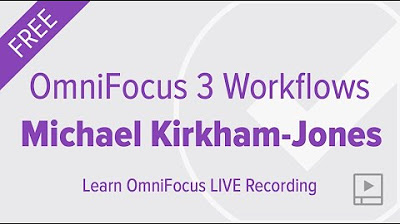Building A Second Brain - Scott Young and Tiago Forte
Summary
TLDRThiago Forte分享了他的新书《构建第二大脑》的核心理念,讨论了如何通过智能笔记和信息组织来提升思考和创造力。他强调了从信息稀缺到信息过剩的转变,以及如何通过提炼关键信息来构建有效的知识系统。Forte还介绍了他的CODE方法,帮助人们在创意过程中捕捉、组织、提炼和表达思想。此外,他还讨论了如何通过PERA系统将笔记转化为可操作的行动,以及他父亲作为艺术家对他创作过程的影响。
Takeaways
- 🧠 构建第二大脑的核心理念是帮助人们更智能地记笔记,组织生活中的信息,并以此提升思考能力。
- 📚 Thiago Forte的书籍《Building a Second Brain》强调了有效笔记和信息组织在学习和个人成长中的重要性。
- 🌐 在信息极度丰富的今天,我们面临着从信息稀缺到信息过剩的挑战,需要新的策略来管理知识。
- 🔄 笔记的过程应从记忆扩展(Remember)、连接(Connect)到创造(Create)三个阶段逐步发展。
- 📈 通过PERA系统(Projects, Areas, Resources, Archives)来组织笔记,确保信息在需要时能够被轻松检索。
- 🚀 创造性工作不仅仅是关于灵感和天赋,还需要系统性和方法论来实现想法的具体化。
- 📝 记笔记不仅是为了扩展记忆,更是一个思考和理解自己想法的工具。
- 🛠️ 使用数字工具来构建第二大脑,可以更好地适应现代工作环境和提高效率。
- 🔗 通过建立信息之间的链接,可以发现意想不到的洞见和创意。
- 🎯 完成创造性项目是现代知识工作中最重要的进步单位,需要有意识地推动项目完成。
- 👨🎨 Thiago的父亲作为艺术家,展示了即使是创意工作也需要有条理和系统性的方法来实现成功。
Q & A
什么是构建第二大脑的核心理念?
-构建第二大脑的核心理念是将个人笔记和信息组织成一个系统化的知识库,以帮助人们更好地整理生活中的信息,提高思考和创造力。
为什么作者认为大多数人不擅长记笔记?
-作者认为大多数人不擅长记笔记是因为他们缺乏系统性的方法来回顾和整理笔记,导致信息收集变得无效,无法在需要时找到和应用相关知识。
CODE框架是什么,它如何帮助创造性过程?
-CODE框架是作者提出的一个创造性过程框架,代表捕获(Capture)、组织(Organize)、提炼(Distill)和表达(Express)。它通过标准化创造性工作流程,帮助人们更有效地管理信息和创意。
作者如何使用数字化工具来构建自己的第二大脑?
-作者推荐全面采用数字化工具来构建第二大脑,并通过建立一个名为'第二大脑资源指南'的在线资源,持续更新和推荐各种笔记应用、网页剪辑器、音频或视频转录应用等工具。
PERA系统是什么,它如何帮助组织笔记?
-PERA系统是一种组织笔记的方法,代表项目(Projects)、领域(Areas)、资源(Resources)和档案(Archives)。它通过将信息分类并按优先级排序,帮助人们将笔记变得可操作,确保在正确的时间遇到正确的信息。
作者如何将记笔记与思考结合起来?
-作者认为记笔记不仅仅是为了扩展记忆,更是一个思考的工具。通过将笔记放在一起,人们可以发现它们之间不曾注意到的关系,从而促进创新思维和理论的形成。
作者的父亲如何影响他对创造性工作的看法?
-作者的父亲是一位艺术家,他展示了即使是创造性工作也需要系统性和结构性。这种认识使作者意识到,要想在创意领域取得成功,不仅需要才华和想法,还需要有条不紊的工作流程。
作者如何看待数字工具与纸质工具在记笔记方面的比较?
-作者认为,尽管一些原则可以应用于纸质笔记,但他认为我们已经到了一个转折点,即我们的设备无处不在,软件足够强大、易用,且连接性几乎普遍,因此他推荐全面采用数字化工具。
在构建第二大脑的过程中,作者如何处理信息的过载问题?
-作者通过区分可操作信息和非可操作信息来处理信息过载问题。他强调了从信息稀缺心态转向信息丰富环境下的心态转变,并鼓励人们专注于提取信息中的'信号',即主要观点和核心要点。
作者在书中提到的'记忆扩展'阶段是指什么?
-'记忆扩展'阶段是指通过外部存储系统(如笔记应用)来卸载那些不需要记忆的信息,从而为思考、想象和创造提供空间。这是构建第二大脑的初级阶段,目的是释放大脑带宽,以便进行更深层次的思考。
作者如何描述他在写作书籍时的过程?
-作者描述了他的写作过程是将大型项目分解为多个小项目,每个项目都有其自己的目标、约束和里程碑。他通过识别可以管理的最小任务来逐步推进每个项目,并在完成一个阶段后触发下一个阶段。
Outlines

This section is available to paid users only. Please upgrade to access this part.
Upgrade NowMindmap

This section is available to paid users only. Please upgrade to access this part.
Upgrade NowKeywords

This section is available to paid users only. Please upgrade to access this part.
Upgrade NowHighlights

This section is available to paid users only. Please upgrade to access this part.
Upgrade NowTranscripts

This section is available to paid users only. Please upgrade to access this part.
Upgrade NowBrowse More Related Video
5.0 / 5 (0 votes)






